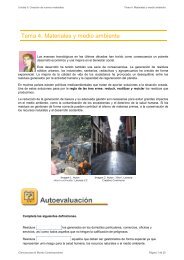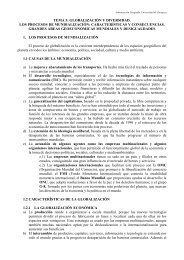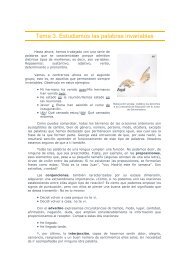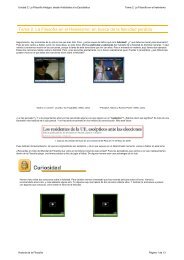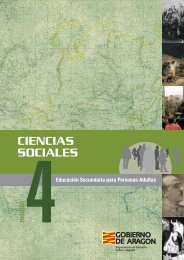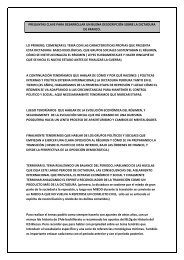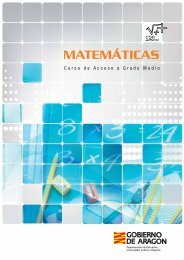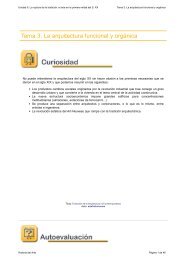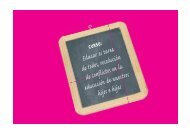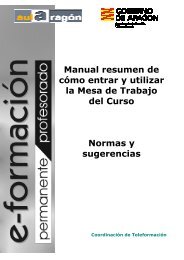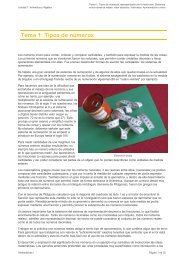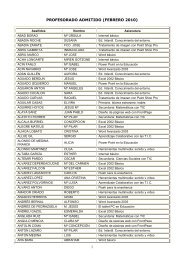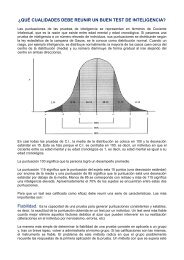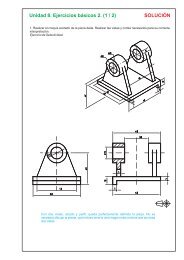Educación Secundaria para Personas Adultas 2módulo - aulAragon
Educación Secundaria para Personas Adultas 2módulo - aulAragon
Educación Secundaria para Personas Adultas 2módulo - aulAragon
You also want an ePaper? Increase the reach of your titles
YUMPU automatically turns print PDFs into web optimized ePapers that Google loves.
INGLÉS<br />
8. Buying and using services online: buy products online make travel reservations<br />
use your bank's online service pay bills order food, groceries online sell things<br />
9. Learning online: check a fact investigate topics of personal interest<br />
look up a dictionary get information for school projects<br />
distance learning for an academic degree<br />
10. Internet friends: none one or two three to five six to nine ten or more<br />
11. Reasons to start using Internet: school or a course keep in touch with friends and family<br />
work personal use: I thought it could be interesting buy products online<br />
12. Negative experiences on the Internet: receiving Spam viruses when using email<br />
ending up on a pornographic website accidently<br />
First, read the questions carefully and then, tick the boxes that are relevant for you.<br />
In general terms, we could say that if the answer to question 2 is YES, and you have ticked many boxes<br />
in questions: 1, 3, 4, 5, 6, 7, 8, 9 and 11, ... YOU ARE QUITE AN INTERNET FREAK<br />
GRAMMAR<br />
CAN / COULD – PODER<br />
Can: puedo<br />
Could: podría (permiso), podía, sabía (capacidad)<br />
Affirvative form<br />
Negative form<br />
I/you can / could<br />
I/you can't / couldn't<br />
He/she/it can / could<br />
He/she/it can't / couldn't<br />
We/you/they can / could We/you/they can't / couldn't<br />
• Cannot = Can't<br />
Could not = Couldn't<br />
• En forma interrogativa, invertimos el verbo y el sujeto:<br />
Could you swim when you were five?<br />
Sabías nadar cuando tenías cinco años?<br />
Can she speak French?<br />
Habla francés?<br />
CAN se usa <strong>para</strong>:<br />
• capacidad: I can drive<br />
Sé conducir<br />
• posibilidad: He can start his lesson today<br />
Puede empezar la clase hoy<br />
• permiso: Can I go to the concert? No, you can't ¿Puedo ir al concierto? No, no puedes<br />
COULD, a veces es el pasado de CAN, pero también se usa <strong>para</strong>:<br />
• expresar posibilidad: James could go to prison for stealing the money<br />
James podria ir a la cárcel por robar el dinero<br />
• expresar capacidad en pasado: I could ski quite well when I was 8<br />
Esquíaba bastante bien cuando tenia 8 años<br />
• pedir, dar permiso (más formal que CAN): Could I use your mobile to phone my husband?<br />
¿Podría usar su móvil <strong>para</strong> llamar a mi marido?<br />
[ 152 ] Módulo 2



